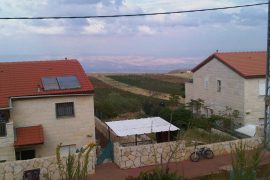
In an op-ed on Friday at The Independent, former British foreign secretary Jack Straw revisited a narrative he advanced late last year regarding the alleged injurious impact of funds from Jewish and pro-Israeli groups in the U.S.
During a Parliamentary debate on diplomacy in the Mid-East in late October, Straw reportedly complained that the greatest obstacle to peace between Israel and its Arab neighbors is the “unlimited” funds available to Jewish groups and AIPAC which are used to control American policy – comments which Israeli Ambassador Daniel Taub complained represented familiar tropes about “sinister Jewish power”.
Straw’s Jan. 17 Indy op-ed (‘In Hasan Rouhani’s Iran, you can feel the winds of change‘), addresses the broader issue of U.S. – Iran relations, and is giddy with excitement over the peace and harmony that could be achieved if we place our trust in the beneficence of Iran’s putatively moderate president, Hassan Rouhani.
You can sense the thrill going up his leg as he waxes eloquently on the “courageous” Rouhani who has evidently imbued Tehran with the progressive spirit more akin to “Madrid or Athens” than “Mumbai or Cairo” – all of which would be news to the country’s oppressed Bahai, imprisoned democracy activists and opposition leaders, and families of the 33 Iranians executed in the last week alone.
The antagonist in Straw’s Iranian Spring tale is clear by the third paragraph, where he recalls his encounters with leaders of the Islamic Republic in 2001:
My first visit to Iran was in late September 2001, in the immediate aftermath of 9/11. The moderate Iranian President, Mohammad Khatami, had courageously reached out to the United States with moral, and much practical, support in the struggle to counter al-Qa’ida.
Then, I went straight from Tehran to Israel. The Israelis concocted a diplomatic row over my using the noun “Palestine” rather than the adjective “Palestinian” in an article for the Iranian press. A banquet for me was cancelled and my meeting with the then Prime Minister Ariel Sharon was delayed until the small hours. Behind this grammatical nonsense there was a much bigger issue – as there still is – about whether Israel wanted an end to the isolation of Iran, or whether it suited them for Iran to be damned as a “pariah state” for all time.
Since Israeli and American politics are so intertwined, this was a major question for the US government, too. There are more American PhDs in Iranian President Hassan Rouhani’s Cabinet than there are in US President Barack Obama’s Cabinet. Yet the US quickly squandered all the potential of Mr Khatami’s bid for rapprochement with the West, with the ill-judged inclusion of Iran in President George W Bush’s “axis of evil”. Indeed, US policy so undermined the Khatami administration that the reformists lost ground, to be replaced by the populist hard-liner Mahmoud Ahmadinejad.
Pivoting to the Rouhani era and the nuclear deal negotiated between Iran and the P5+1, Straw writes:
President Rouhani’s election last summer was as overwhelming as it was surprising. “He only had 5 per cent in the polls when we started”, one proud supporter told us. The consequences of Mr Rouhani’s victory cannot be overstated. There’s a lightness in the air…
…
Sustained economic recovery depends in part on internal reform, but also on an end to the nuclear-related sanctions…Sanctions can have eccentric effects. Five hundred Porsches were imported last year, it is claimed. Coca-Cola is freely available; but banking sanctions mean that cancer patients cannot access life-saving imported drugs, even though formally these have been exempt from control.
November’s interim deal agreed in Geneva between Iran and the “P5 + 1” (the five Permanent Members of the Security Council, plus Germany) will come into force on Monday. There’s an obvious prize for Iran in ending all sanctions. There is for the UK too. Above and beyond big trade opportunities, a normalisation of relations will have profound benefits, not least in those troubled countries – Syria, Iraq, Lebanon, Palestine – where Iran has such influence.
Finally, Straw cites the greatest obstacle to the normalisation of relations and peace in the region:
Whether a comprehensive deal on Iran can be reached will crucially depend on how far Mr Obama is able to resist the intense lobbying (and financial support) Mr Netanyahu is able to muster in the US Congress.
Beyond Straw’s repugnant suggestion that pro-Israel elements in the US Congress take their marching orders from Jerusalem, and his failure to acknowledge that pro-Israel (and anti-Iran) sentiment is embraced by the overwhelming majority of Americans, it’s important to recall that his recent charges leveled at Jewish groups and Israel seem to reflect a broader narrative of Zionist root causes.
A few weeks after 9/11, Straw led a Western delegation to Tehran, and delivered the following message in the context of the deadly attacks by al-Qaeda which killed nearly 3,000 Americans: “I understand that one of the factors which helps breed terrorism is the anger which many people in this region feel at events over the years in Palestine.”
Of course, one of the factors which undeniably leads to violence and instability in the Middle East is Iran’s role, according to the U.S. State Department, as the leading state sponsor of terrorism in the world.
However, when you wake up in the morning genuinely convinced that Israel and the state’s Jewish supporters represent the biggest obstacle to peace in the Middle East, then even a reactionary, Islamist regime which exports terror abroad, while repressing religious minorities, women, gays and political dissidents at home, can evoke your ‘liberal’ sympathy.












